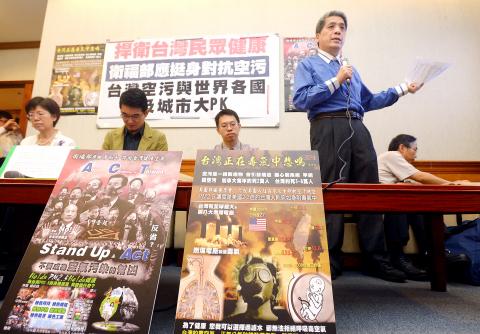The average air quality in Taiwan has become the worst among the four “East Asian Tigers” — Taiwan, Hong Kong, Singapore and South Korea — and even worse than some cities in China, the Taiwan Healthy Air Action Alliance and legislators said yesterday.
Alliance founder and Changhua Christian Hospital gynecologist Yeh Guang-peng (葉光芃) said he and the Changhua Medical Alliance for Public Affairs had analyzed air quality reports published by the WHO, and discovered that the annual average of PM10 (fine particles in the air smaller than 10 micrometers in size) concentration in Taiwan was as high as 54 micrograms per cubic meter.
He said the annual average PM10 level of Taiwan was about two times that of Austria and Singapore, the highest among the East Asian Tigers and even higher than some cities in Southeast Asia and China.

Photo: Wang Yi-sung, Taipei Times
Furthermore, Yeh said the PM10 annual average in Taipei — 47.1 micrograms per cubic meter, ranked only 1,089 among 1,600 cities around the world, showing that the nation’s air quality still has much room for improvement.
Comparing that level with a few cities in China, he said the PM10 levels in Shenzhen, Xiamen and Quanzhou were better than those in Chiayi and Greater Kaohsiung; and the air quality in Shanghai was better than Greater Kaohsiung’s Fongshan District (鳳山) and Greater Tainan’s Sinying District (新營).
The alliance said while the environmental and health agencies in other countries are working together to tackle air pollution problems, the Ministry of Health and Welfare seemed to be too passive in dealing with the health risks from serious air pollution.
Lin Chen-su (林真夙), a section chief at the ministry’s Health Promotion Administration, said the agency would work to improve health education to inform the public about air pollution and related health risks, and also to suggest prevention measures.
The Environmental Protection Administration said that the average PM10 levels in the nation have already decreased greatly over the past years, but sometimes high PM10 levels result from certain geographical and climate conditions, such as dust near river banks in central and southern Taiwan, but that it will continue to make efforts to reduce air pollution.
Changhua Medical Alliance for Public Affairs consultant Yang Joe-ming (楊澤民) said children, elderly people and people suffering from asthma or cardiovascular disease are more sensitive to air pollutants and should wear face masks when commuting to reduce harmful exposure.

Alain Robert, known as the "French Spider-Man," praised Alex Honnold as exceptionally well-prepared after the US climber completed a free solo ascent of Taipei 101 yesterday. Robert said Honnold's ascent of the 508m-tall skyscraper in just more than one-and-a-half hours without using safety ropes or equipment was a remarkable achievement. "This is my life," he said in an interview conducted in French, adding that he liked the feeling of being "on the edge of danger." The 63-year-old Frenchman climbed Taipei 101 using ropes in December 2004, taking about four hours to reach the top. On a one-to-10 scale of difficulty, Robert said Taipei 101

A preclearance service to facilitate entry for people traveling to select airports in Japan would be available from Thursday next week to Feb. 25 at Taiwan Taoyuan International Airport, Taoyuan International Airport Corp (TIAC) said on Tuesday. The service was first made available to Taiwanese travelers throughout the winter vacation of 2024 and during the Lunar New Year holiday. In addition to flights to the Japanese cities of Hakodate, Asahikawa, Akita, Sendai, Niigata, Okayama, Takamatsu, Kumamoto and Kagoshima, the service would be available to travelers to Kobe and Oita. The service can be accessed by passengers of 15 flight routes operated by

Taiwanese and US defense groups are collaborating to introduce deployable, semi-autonomous manufacturing systems for drones and components in a boost to the nation’s supply chain resilience. Taiwan’s G-Tech Optroelectronics Corp subsidiary GTOC and the US’ Aerkomm Inc on Friday announced an agreement with fellow US-based Firestorm Lab to adopt the latter’s xCell, a technology featuring 3D printers fitted in 6.1m container units. The systems enable aerial platforms and parts to be produced in high volumes from dispersed nodes capable of rapid redeployment, to minimize the risk of enemy strikes and to meet field requirements, they said. Firestorm chief technology officer Ian Muceus said

MORE FALL: An investigation into one of Xi’s key cronies, part of a broader ‘anti-corruption’ drive, indicates that he might have a deep distrust in the military, an expert said China’s latest military purge underscores systemic risks in its shift from collective leadership to sole rule under Chinese President Xi Jinping (習近平), and could disrupt its chain of command and military capabilities, a national security official said yesterday. If decisionmaking within the Chinese Communist Party has become “irrational” under one-man rule, the Taiwan Strait and the regional situation must be approached with extreme caution, given unforeseen risks, they added. The anonymous official made the remarks as China’s Central Military Commission Vice Chairman Zhang Youxia (張又俠) and Joint Staff Department Chief of Staff Liu Zhenli (劉振立) were reportedly being investigated for suspected “serious